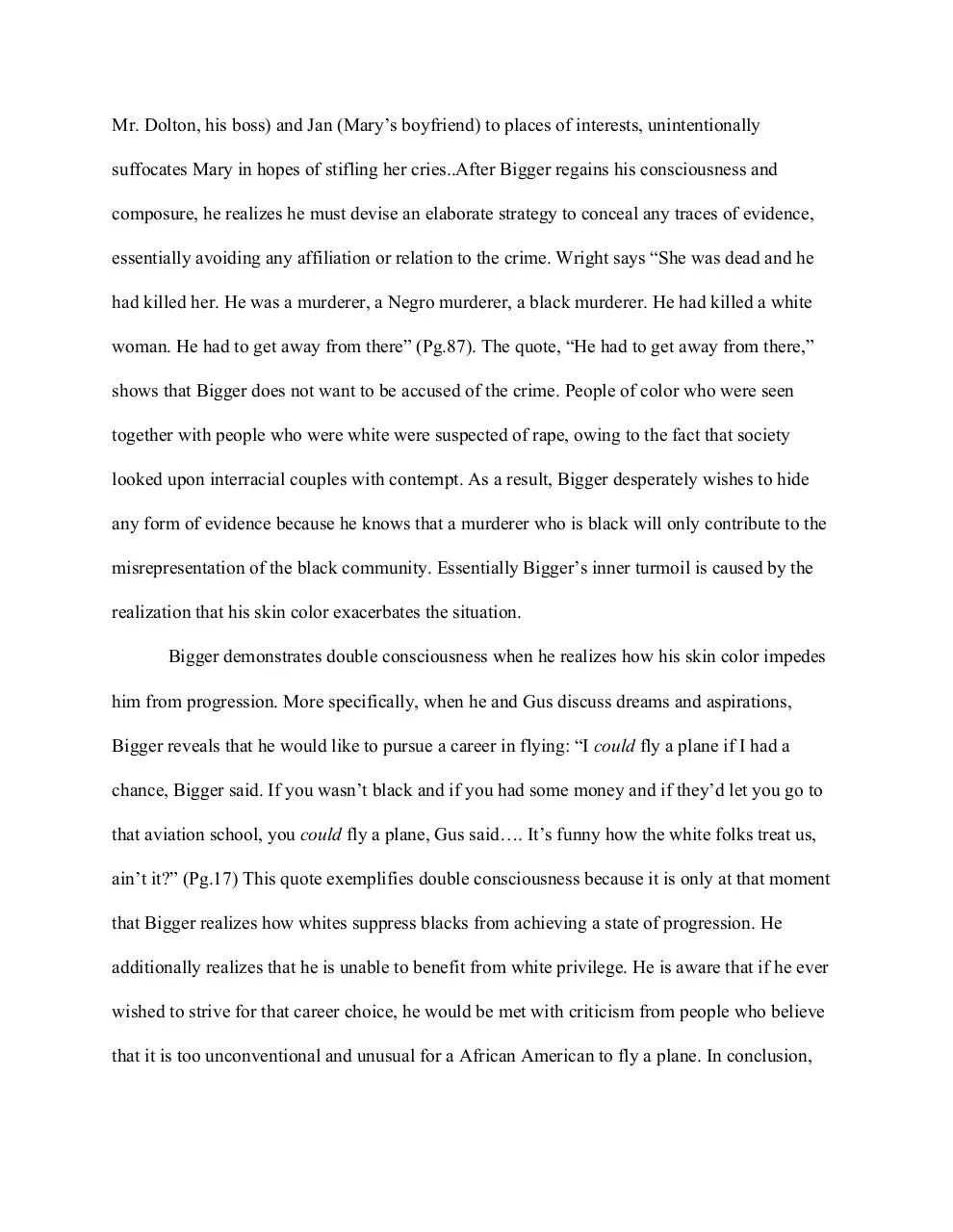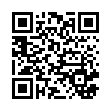NativeSonDoubleConsciousnessEssay (PDF)
File information
This PDF 1.4 document has been generated by / Skia/PDF, and has been sent on pdf-archive.com on 03/03/2016 at 08:24, from IP address 67.245.x.x.
The current document download page has been viewed 357 times.
File size: 128.91 KB (4 pages).
Privacy: public file




File preview
David Santos
ELA Native Son
1/20/16
Native Son
If you have ever been forced to relocate because of financial difficulties or other
complications, then you grasp that at the simplest level coping with your new environment is not
an easy task. Meeting new people, going new places is compellingly stressful for people who are
not adept at adapting. Bigger, a character from Native Son, embodies double consciousness
because he is conflicted with the ideals and impositions of white society while Bigger is unable
to find consistency within himself. In a similar fashion, Bigger experiences conflict akin to
moving because he has met some level of difficulty when attempting to adjust his behavior
around whites. “Native Son is a book by Richard Wright that entails the narrative of Bigger, a
twenty two year old colored man who resides in the ruins of a Chicago neighborhood ridden with
poverty and destitution. Bigger’s mother struggles to raise a family of three all the while Bigger
is burdened with priorities exacerbated by lack of financial support from his father, whose
whereabouts are unknown. At certain points throughout the book, double consciousness is
demonstrated through the persona of Bigger” (Santos, 1). W. E. B. Du Bois was one of the most
iconic figures in all of the AfricanAmerican history, whose ideas strived to resolve the struggles
AfricanAmericans faced, especially men. Double consciousness is the unique feeling that your
identity has been made divergent by societal impositions. Many AfricanAmericans, like Bigger,
were unsure as to where they stood in society and therefore experienced a behavioral crisis.
These feelings were almost exclusive to AfricanAmericans because they were the ones most
affected by double consciousness. Throughout certain segments of the book, Bigger’s persona
can be viewed through the theory of double consciousness.
Bigger and Gus demonstrate their knowledge of doubleconsciousness when they engage
in a game called ‘white.’ Specifically in this part of the book, Bigger is posted up against the
wall, smoking cigarettes with one of his best friend, Gus. In a natural and relaxed state, Bigger
and Gus pensively observe cars as they pass by. To amuse Gus and pass time, Bigger mock the
mannerisms of whites through behavior and speech. Wright writes, “The silence irked Bigger; he
was anxious to do something to evade looking so squarely at this problem. Let’s play ‘white,’
Bigger said, referring to a game of playacting in which he and his friends imitated the ways and
manners of white folks.” (Pg. 17). When Bigger says “Let’s play ‘white’,” he is mocking the
condescending speech of white people. Bigger believes that it is typical of white people to
deploy elaborate words to achieve a certain image or status. Instead of concerning himself with
the interests of others, Bigger should worry about himself because by engaging in the game of
‘white,’ he is only further perpetuating stereotypes about the white community. The fact that
Bigger imitates white society proves that Bigger acknowledges the ways in which white people
speak compared to black people. Important questions arise from Bigger’s double consciousness,
such as “Why would it seem rational for Bigger to try to eliminate or hide certain things about
himself unless there was a significant compelling reason for him to do so?” In truth, Bigger
restrains himself from giving his honest opinion as to how he truly feels. In conclusion, Bigger
unknowingly perpetuates stereotypes and in doing so acknowledges double consciousness.
Another time Bigger displays double consciousness is when he murders Mary. According
to Santos, Native Son reaches its climax when Bigger, after accompanying Mary (the daughter of
Mr. Dolton, his boss) and Jan (Mary’s boyfriend) to places of interests, unintentionally
suffocates Mary in hopes of stifling her cries..After Bigger regains his consciousness and
composure, he realizes he must devise an elaborate strategy to conceal any traces of evidence,
essentially avoiding any affiliation or relation to the crime. Wright says “She was dead and he
had killed her. He was a murderer, a Negro murderer, a black murderer. He had killed a white
woman. He had to get away from there” (Pg.87). The quote, “He had to get away from there,”
shows that Bigger does not want to be accused of the crime. People of color who were seen
together with people who were white were suspected of rape, owing to the fact that society
looked upon interracial couples with contempt. As a result, Bigger desperately wishes to hide
any form of evidence because he knows that a murderer who is black will only contribute to the
misrepresentation of the black community. Essentially Bigger’s inner turmoil is caused by the
realization that his skin color exacerbates the situation.
Bigger demonstrates double consciousness when he realizes how his skin color impedes
him from progression. More specifically, when he and Gus discuss dreams and aspirations,
Bigger reveals that he would like to pursue a career in flying: “I
could
fly a plane if I had a
chance, Bigger said. If you wasn’t black and if you had some money and if they’d let you go to
that aviation school, you
could
fly a plane, Gus said…. It’s funny how the white folks treat us,
ain’t it?” (Pg.17) This quote exemplifies double consciousness because it is only at that moment
that Bigger realizes how whites suppress blacks from achieving a state of progression. He
additionally realizes that he is unable to benefit from white privilege. He is aware that if he ever
wished to strive for that career choice, he would be met with criticism from people who believe
that it is too unconventional and unusual for a African American to fly a plane. In conclusion,
Bigger demonstrates double consciousness because he is aware of the difficulties present when
choosing to pursue certain careers.
Download NativeSonDoubleConsciousnessEssay
NativeSonDoubleConsciousnessEssay.pdf (PDF, 128.91 KB)
Download PDF
Share this file on social networks
Link to this page
Permanent link
Use the permanent link to the download page to share your document on Facebook, Twitter, LinkedIn, or directly with a contact by e-Mail, Messenger, Whatsapp, Line..
Short link
Use the short link to share your document on Twitter or by text message (SMS)
HTML Code
Copy the following HTML code to share your document on a Website or Blog
QR Code to this page

This file has been shared publicly by a user of PDF Archive.
Document ID: 0000345577.